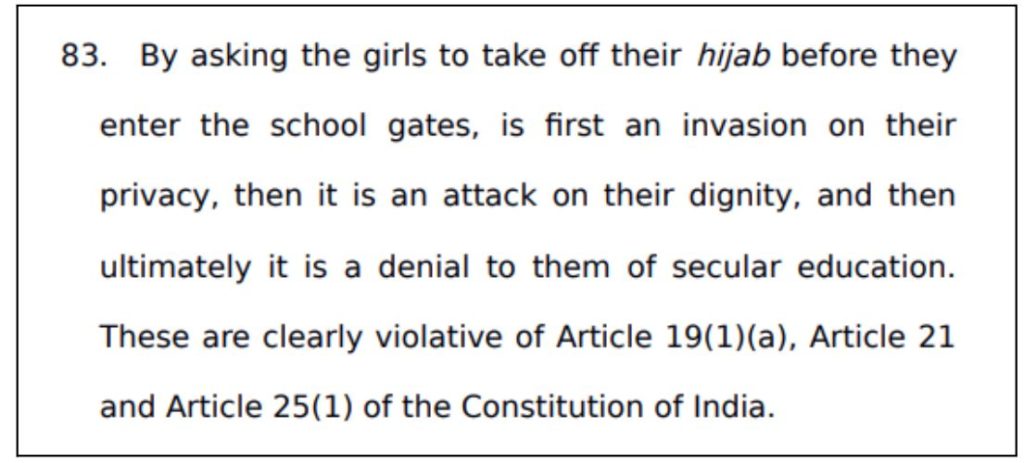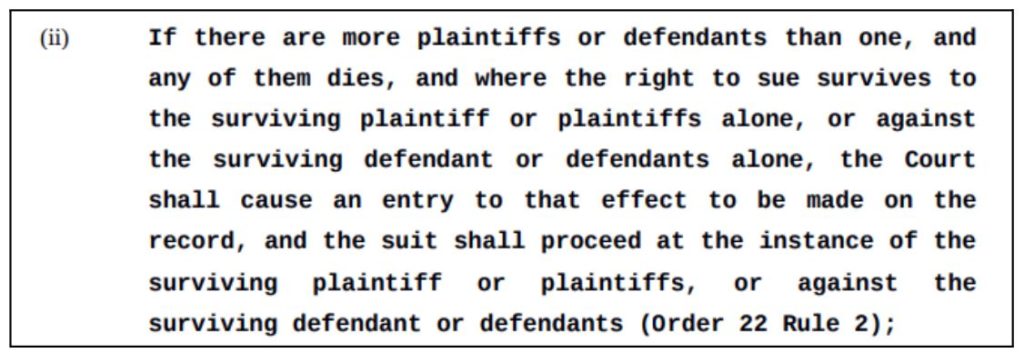In this week’s review of Court Judgments, we look at Supreme Court’s split verdict in the Hijab issue, about Part-payment made after cheque is drawn to be endorsed on cheque, that Courts must scrupulously examine the facts and circumstances of case before convicting an accused for abetment of suicide, that early conclusion of trial is necessary to enhance people’s faith in justice delivery system among others.
SC: Split verdict on appeals against Karnataka HC’s ruling that uniform is to be worn in schools and hijab isn’t a part of essential religious practices in Islam
Earlier this year, multiple petitions were filed in the Supreme Court against the order passed by the Karnataka High Court in March 2022 which held that wearing of hijab or head scarf by Muslim women does not form a part of essential religious practices in Islamic faith and is not protected under the right to freedom of religion guaranteed under Article 25 of the Constitution of India. This ruling upheld the state government’s order in February 2022 which prescribed wearing of uniforms in schools and pre-university colleges under provisions of the Karnataka Education Act, 1983. In Aishat Shifa vs State of Karnataka and others, the Supreme Court Bench of Justices Hemant Gupta and Sudhanshu Dhulia delivered a split verdict on the matter.
Justice Hemant Gupta framed 11 issues. Some of them are what the ambit and scope of right to freedom of ‘conscience’ and ‘religion’ is, ambit and scope of essential religious practices under Article 25, whether the state government’s order contradicts the promotion of literacy, etc. Dismissing the pleas, Justice Gupta upheld the High Court’s order stating that wearing hijab is the belief or faith of an individual and that the religious belief cannot be carried to a secular school maintained out of State funds. Students may carry their faith in schools which permits wearing of hijab or other religious symbols. However, the State is within its jurisdiction to direct that the apparent symbols of religious beliefs cannot be carried to school maintained by the State from the State funds, thereby allowing the State to restrict wearing of hijab.

Meanwhile, Justice Sudhanshu Dhulia allowed the appeals holding that a balance was to be maintained when deciding between school discipline and the cultural and religious rights of minorities. He quashed the government order asking the state and school whether education of a girl child or enforcement of a dress code was more important. Considering the difficulties already being faced by girl students in accessing education in the country, he asked if the life of girls is being made any easier by denying access to education on grounds of wearing a hijab. Justice Dhulia also asked how a girl child wearing hijab in a classroom could be a public order or a law-and-order problem and added that living and adjusting with the differences is the sign of a mature society.

Considering the divergence of opinion, the matter is placed before the Chief Justice of India for referring it to a larger bench.
SC: Part-payment made after cheque is drawn should be endorsed on cheque
In Dashratbhai Trikambhai Patel vs. Hitesh Mahendrabhai Patel and others, the appellant had lent a loan of Rs. 40 Lakhs to the first respondent. Two cheques were given to the appellant for security which would be returned when the respondent would finish paying the loan. Though the borrower paid Rs. 4,09,315 in total, the appellant presented the cheque for Rs 20 lakhs, without endorsing the part-payment.
The Trial Court had observed that the appellant failed to prove that he was owed a legally enforceable debt of Rs. 20 lakhs. An appeal was filed against this judgement in the Gujarat High Court which found that the first respondent had deposited Rs. 4,09,315 in his account. It also found that part -payment made by the first respondent should have been reflected in the statutory notice issued by the appellant and added that an offence under Section 138 of the Negotiable Instruments Act was not made. The appellant filed an appeal against the HC’s judgement.
While hearing the case, the Supreme Court Bench of Justices DY Chandrachud and Hima Kohli dismissing the appeal and held that if a part- payment of debt is made after the cheque is drawn but before the cheque is encashed, the payment must be endorsed on the cheque under Section 56 of the Negotiable Instruments Act. Further, the cheque cannot be presented for encashment without recording the part payment. If the unendorsed cheque is dishonoured on presentation, the offence under Section 138 Negotiable Instruments Act would not be attracted since the cheque would not represent a legally enforceable debt at the time of encashment.

SC: Courts must scrupulously examine the facts and circumstances of case before convicting an accused for abetment of suicide.
In Mariano Anto Bruno vs. Inspector of Police, the appellant’s wife’s death was recorded as unnatural under Section 174 of CrPC. The deceased’s mother filed a complaint against the appellant and his parents for offences under 498A (cruelty by husband and his relatives) and 306 of IPC (abetment of suicide). The trial court convicted the appellant and his mother. The decision was challenged by the appellants in the High Court which dismissed the appeal.
While hearing the case, the Supreme Court Bench comprising Justices MR Shah and Krishna Murari held that both Trial Court and High Court had failed to properly analyse the facts of the case. With respect to charges under 498A of IPC, the bench noted that there was no evidence to establish the allegation ill treatment or dowry demand during her marriage. With regards to abetment to suicide, the Court reiterated that action forcing the person to commit suicide proximate to the time of suicide should be established to frame charges under Section 306 of IPC. Also, there must be a proof of direct or indirect acts of incitement to the commission of suicide. Emphasizing that before convicting an accused under Section 306 IPC, the Court must carefully examine the facts and circumstances of the case, the SC Bench acquitted the accused.

SC: Early conclusion of trial is necessary to enhance people’s faith in justice delivery system
In Gali Janardhan Reddy vs. State of Andhra Pradesh, the applicant is an accused in an illegal mining case. His bail application was rejected by the High Court in 2013 on grounds that he was influential and could influence the investigation. However, by an order in 2015, he was granted bail on certain conditions, among which was a restriction to visit the districts of Bellary in Karnataka and District of Ananthapuram and Cuddapah in Andhra Pradesh. In his latest bail application, he requested for entry and stay in these districts as his daughtered had delivered a baby and he wanted to stay with her.
The SC bench of Justices MR Shah and Krishna Murari modified the condition and asked the Trial and Special Courts to conduct the trial on day-to-day basis and conclude the trial within six months following the applicant’s allowed duration of stay ends on 06 November 2022. The Bench also expressed its displeasure on the fact that the trial on the case had not begun even after 11 years of filing FIR despite the Court’s directions to do so. The faith of people in the justice delivery system will enhance through early conclusion of trial and it directed the courts to conclude the trial at the earliest since delay would otherwise impede fair and uninfluenced investigation.

SC: Entire suit with multiple plaintiffs cannot be abated in case of death of one plaintiff
In Siravarapu Appa Rao vs. Dokala Appa Rao, the Trial Court decided a suit for declaration of title and recovery of possession filed by the plaintiffs. The First Appellate Court allowed the appeal since one of the plaintiffs had died and her legal representatives were not brought on record which meant that the suit got abated not only against the deceased plaintiff but also against the other plaintiff-appellants as it was a joint claim. The High Court also dismissed the second appeal on the same ground.
While hearing the case, the issue before the Supreme Court was if the non-substitution of legal representatives of some of the plaintiff and/or on demise of the some of the respondents during the pendency of the first appeal, whether the entire appeal would stand abated, or it will be so only in respect of the particular deceased respondent. Referring to a recent judgement, the Bench allowed the appeal and held that where there is more than one plaintiff, the entire suit cannot be held to be abated on the death of one of the plaintiffs as per Order 22 Rule 2 of CPC.

SC: One is entitled to seek remedy if more than four months is taken for deciding on sanction
In Vijay Rajmohan vs. State, the appellant is an official of the Central Secretarial Service, Government of India. During his posting in Delhi from 2005 to 2012, he is alleged to have made assets disproportionate to his income. In 2015, CBI registered an FIR against him and his parents. After investigation, CBI sought sanction from the appointing authority, the Department of Personnel and Training (DoPT) for prosecuting the Appellant. DoPT sought clarifications from the CBI and felt that there were many errors in CBI’s investigation and sought the Central Vigilance Commission’s opinion (CVC). After clarifying with CBI, CVC was of the view that it was a strong case for granting sanction subject to the CBI conducting a re-investigation on certain aspects of the case. Following CBI’s report, the CVC asked DoPT to grant sanction for prosecution. The sanction was granted after 1 year 10 months.
The appellant filed a discharge application on the ground that the sanction order was passed without application of mind. The Madras High Court had allowed a criminal revision petition filed by the State against the order of the Trial Court, discharging the accused citing that the sanction order under Section 19 of the Prevention of Corruption Act is void due to non-application of mind by sanctioning authority.
In his appeal, the following issues were raised before the Supreme Court.
- Whether the order of sanction is illegal due to non-application of mind by the DoPT for acting as per dictation of CVC
- Whether the criminal proceedings could be quashed for the delay of about two years in the issuance of the sanction order.
The SC bench of Justices BR Gavai and PS Narasimha held that there was no illegality in the sanction of DoPT. It also held that the period of three months which is extendable by one more month for legal consultation under Section 19 of the Prevention of Corruption Act for the Appointing Authority to decide upon a request for sanction is mandatory. Once this period is over, the aggrieved party is entitled to approach the concerned writ court and seek appropriate remedies, including directions for action on the request for sanction to hold the sanctioning authority accountable. The Bench allowed the appellant to raise and seek such remedies and dismissed the HC’s judgement.



